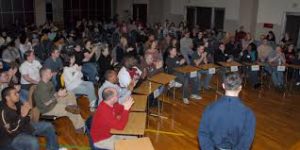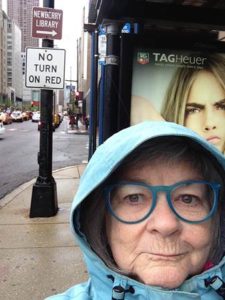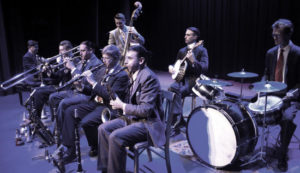Mondays with Mike: Happy birthday you crazy web thing
February 5, 2018 • 7 Comments • Posted in Mondays with Mike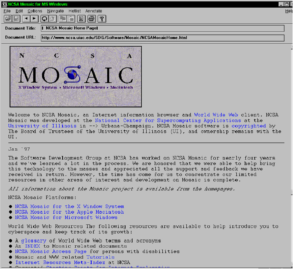
That’s what the web looked like in 1993.
Sometime last week I happened on an article titled “Mosaic’s birthday: 25 years of the modern web”.
The opening paragraph is a story in itself:
In the beginning, the web, or WEB as it was known then, was a mystery. Like gopher and archie, it was a character-based internet tool interface that only the proud, the few, and the early internet users knew about. Then, everything changed. First, the Commercial Internet Exchange (CIX) made it easy for anyone to get on the net, and then two graduate students, Marc Andreessen and Eric Bina, at the National Center for Supercomputing Applications (NCSA) at the University of Illinois Urbana-Champaign, created the first popular web browser: Mosaic.
On one hand it’s hard to believe it’s already been 25 years. On the other, it’s hard to believe that just 25 years ago, we weren’t using email, browsers, social media—or reading blogs.
Back in the early 1990s, when we lived in Urbana, Illinois, I was privileged to be present at the creation of the web. I worked at a spinoff from the aforementioned NCSA called Spyglass. Spyglass developed data visualization software for brainiac researchers in fields like astrophysics, climatology, oceanography and hydrology.
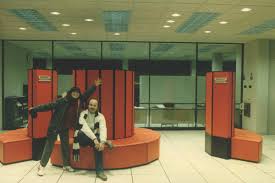
The Cray supercomputer at NCSA back in the day. Not exactly compact.
The genesis: The University of Illinois’ NCSA had acquired a Cray supercomputer. NCSA took applications from scientists around the country to use supercomputing time for their research, and awarded supercomputing time to the best of the lot.
The scientists who were selected and got to run their simulations then faced another problem: They generated unprecedented volumes of data that were impossible to interpret visually with conventional graphing tools. (Hard as it is to imagine, even those color weather maps of temperature/barometric pressure didn’t exist yet.)
Spyglass developed a suite of tools that allowed users to create a bunch of new, colorful kinds of graphics from enormous datasets. Because back then the Mac had superior graphical capabilities, that’s what our products were on (until Windows 95 came out).

Sales sheet for the Spyglass data visualization software.
The products were super cool. I wrote the manuals for them (yes, paper books that were packaged in boxes with diskettes), as well as marketing materials, ad copy, etc. We were, in a word, a pretty lean operation. We had to be. Our market was pretty nichey. We were fighting for our commercial lives. Then one day one of the company founders got an email from Tim Berners-Lee. Berners-Lee was a brainiac with the European Organization for Nuclear Research (CERN)—this is the joint that now runs the Hadron Supercollider.
The email explained this new thing, the web, with hypertext links. Meanwhile the kids at NCSA—Andreesen and Bina—were adding graphical capabilities to Mosaic. ,
I still remember seeing the web for the first time at our modest little office in Savoy, Illinois. A group of us was looking over the shoulder of one of our code guys as he surfed the small number of web sites that existed—mostly corporate sites of big technology-focused companies. By today’s standards, they were incredibly crude. But back then, it was magic.
Bina and Andreesen—and a lot of their NCSA colleagues—headed to Silicon Valley to seek fortune and fame at a company that eventually morphed into Netscape. The University was left with a successful program, a bunch of browser code, but not much else. Spyglass stepped in, struck a deal with the university, cleaned up the code for commercial markets, and started selling Mosaic.
We had a visionary CEO named Doug Colbeth, whom I’m proud and grateful to still call a friend. He knew that browsers were not a sustainable business. Spyglass sold the code to Microsoft, and it became Microsoft Internet Explorer. Spyglass morphed yet again into a company that was ahead of its time—it created browser code that could be embedded in a variety of devices—anything from TVs to exercise treadmills. Spyglass was talking about the internet of things before the term existed.
When I joined Spyglass, I was one of about a dozen employees. We didn’t have health insurance, but in lieu of such things, we got pieces of paper called stock options. Beth, being practical, preferred cold, hard cash. But I was elated—somebody thought enough of me to make me an owner.
We worked our asses off and got lucky. Spyglass went public in 1995. We celebrated with a big picnic at the Kane County Cougars—a minor league baseball team—in Geneva, Illinois.
But even after that, we couldn’t hold still. Companies were being born and going out of business on a daily basis. One day I’d come into the office thinking, “We’re gonna own the world.” The next, “We might not be here in three months.”
But thanks to Doug’s course correction, we survived. We grew. We had corporate retreats. We had Jim Lovell, of Apollo 13, speak at one of them. We had arrived.
For some of us, the thrill was gone. I was one of those. I left. Those pieces of paper bought me and Beth and our son Gus two seasons on the beach in Nags Head, North Carolina. Every morning I put Gus on the bus, and every afternoon I took him off. I watched dolphins work their way along the coast while Beth and I had morning coffee. We body surfed and took outdoor showers that made our skin feel like we were 12 years old. If we hadn’t spent that time on the beach, I might be retired by now. But I’d do it again in a heartbeat.
Sometime I can’t believe it all happened. But it did. And it reminds me that for all our human faults, there are always people out there pushing the envelope of knowledge just because. It reminds me of the importance of public research institutions. Of collaboration.
It also makes me remember that, although not everything in my life, in our lives, has gone the way we’d hoped, George Bailey has nothing on me.
